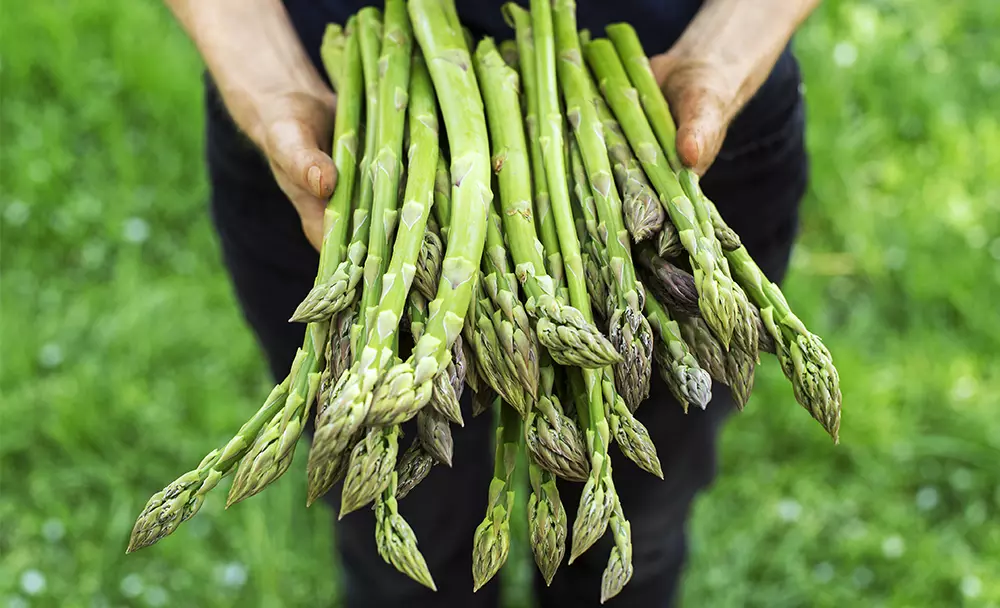
Do you eat asparagus? Known as one of the healthiest vegetables, it is loaded with antioxidants and anti-inflammatory properties
Eating asparagus can yield many health benefits and treat numerous medical conditions like depression, hypertension, etc.
Let’s have a look at the benefits of asparagus in detail in this article and then also see if Ayurveda says anything about it.
Asparagus Benefits
Here are some of the incredible asparagus benefits that you shouldn’t miss.
1. Digestive Health
Primary Benefits: Asparagus is rich in insoluble fibre, which helps add bulk to stool and regulate bowel movements. It also contains a small amount of soluble fibre that supports the growth of friendly bacteria in the gut.
Secondary Benefits: It hence aids in boosting digestive health and preventing several gastrointestinal problems like constipation.
2. Pregnancy
Primary Benefits: Loaded with folate or vitamin B9, asparagus helps form red blood cells and DNA for healthy growth and development of the foetus.
Secondary Benefits: Additionally, folate also helps protect against neural tube defects, including spina bifida, that can lead to many complications, such as learning difficulties, lack of bowel and bladder control, physical disabilities, etc.

3. Blood Pressure
Primary Benefits: one of the major asparagus benefits is that it is loaded with potassium. According to research, potassium helps relax the walls of blood vessels and excrete excess salt through urine.
Secondary Benefits: As such, asparagus helps in lowering blood pressure levels and reducing the risk of cardiovascular disease.
4. Weight Loss
Primary Benefits: Low in calories and rich in water content, asparagus is highly beneficial for people trying to lose weight.
Secondary Benefits: In addition, asparagus is also loaded with fibre which is associated with lower body weight and weight loss.
5. Depression
Primary Benefits: Folate prevents excessive production of homocysteine which is an amino acid that can block blood and nutrients from reaching the brain and affect mood, sleep, and appetite.
Secondary Benefits: As such, it helps to not only reduce the risk of depression but also promote foetal development.
6. Osteoporosis
Primary Benefits: Asparagus is loaded with vitamin K, which is known to boost bone health and prevent osteoporosis.
Secondary Benefits: It also contains several other nutrients that support bone health, like phosphorus, iron, zinc, magnesium, and calcium.
6. Cancer
Primary Benefits: Rich in antioxidants, asparagus helps fight free radical damage which is one of the leading causes of cancer.
Secondary Benefits: In addition, asparagus also contains fibre which helps prevent several cancers like colorectal cancer.
7. Female Reproductive Health
Primary Benefits: Asparagus racemosus or Shatavari helps treat several female health conditions, specifically reproductive disorders.
Secondary Benefits: Studies have found that Shatavari can help improve conditions of hormonal imbalances and treat polycystic ovary syndrome (PCOS).
8. Menopause
Primary Benefits: Asparagus racemosus or Shatavari has been used for reducing symptoms of menopause for centuries. Many studies also confirm the effect of Shatavari on menopausal symptoms such as hot flashes and night sweats.
Secondary Benefits: By reducing the symptoms of menopause, Shatavari can help enhance the quality of life of women.
9. Lactation
Primary Benefits: Shatavari, or Asparagus racemosus, is one of the best natural galactagogues. It has been used in Ayurvedic medicine since ages to boost the milk supply in lactating mothers. Many clinical studies have also confirmed this result.
Secondary Benefits: As such, it helps to boost the health of new mothers as well as infants and prevent several health problems associated with low lactation.
10. Asparagus: An Ayurveda View
More than 250 species of asparagus are found throughout the world, out of which 22 are found in India. One of these species is Asparagus racemosus or Shatavari.
Known in Ayurveda as the queen of herbs, Shatavari is used for treating numerous diseases, especially the ones related to women.
In Ayurveda, Shatavari is mostly regarded for its role in enhancing lactation, providing strength, enhancing sperm count and motility and treating urination problems.
The Additional Benefits of Shatavari, the Indian Asparagus
On a Final Note
Asparagus is one of the healthiest vegetables. It helps prevent cancer, manage diabetes, promote digestion and improve bone health.
One of the species of asparagus is Shatavari which is used in Ayurvedic medicine to manage numerous conditions, especially the ones related to the female reproductive system. It is also one of the best natural galactagogues and helps improve milk supply in lactating women.
References
- https://www.ijrrjournal.com/IJRR_Vol.8_Issue.5_May2021/IJRR011.pdf
- https://www.sciencedirect.com/science/article/pii/S1756464619306516
- https://www.ncbi.nlm.nih.gov/pmc/articles/PMC3705355/
- https://fdc.nal.usda.gov/fdc-app.html#/food-details/168389/nutrients
- https://www.ncbi.nlm.nih.gov/pubmed/24284617
- https://www.ncbi.nlm.nih.gov/pubmed/17209211
- https://www.ncbi.nlm.nih.gov/pubmed/24048206
- https://www.ncbi.nlm.nih.gov/pmc/articles/PMC4023229/
- https://www.urmc.rochester.edu/encyclopedia/content.aspx?contenttypeid=167&contentid=folate
- https://www.ncbi.nlm.nih.gov/pubmed/16467502
- https://www.ncbi.nlm.nih.gov/pmc/articles/PMC4848697/
- https://www.ncbi.nlm.nih.gov/pubmed/22480489
- https://www.ncbi.nlm.nih.gov/pmc/articles/PMC3257631/
- https://www.ncbi.nlm.nih.gov/pubmed/23885994
- https://www.ncbi.nlm.nih.gov/pmc/articles/PMC2248201/
- https://ods.od.nih.gov/factsheets/Folate-HealthProfessional/
- https://www.hindawi.com/journals/bmri/2018/4629383/
- https://www.cancer.gov/about-cancer/causes-prevention/risk/diet/antioxidants-fact-sheet
- https://www.ncbi.nlm.nih.gov/pmc/articles/PMC4588743/
- https://www.ncbi.nlm.nih.gov/pubmed/29635127
- https://www.sciencedirect.com/science/article/pii/S2210803318300010
- https://www.ncbi.nlm.nih.gov/pmc/articles/PMC5158159/\



















